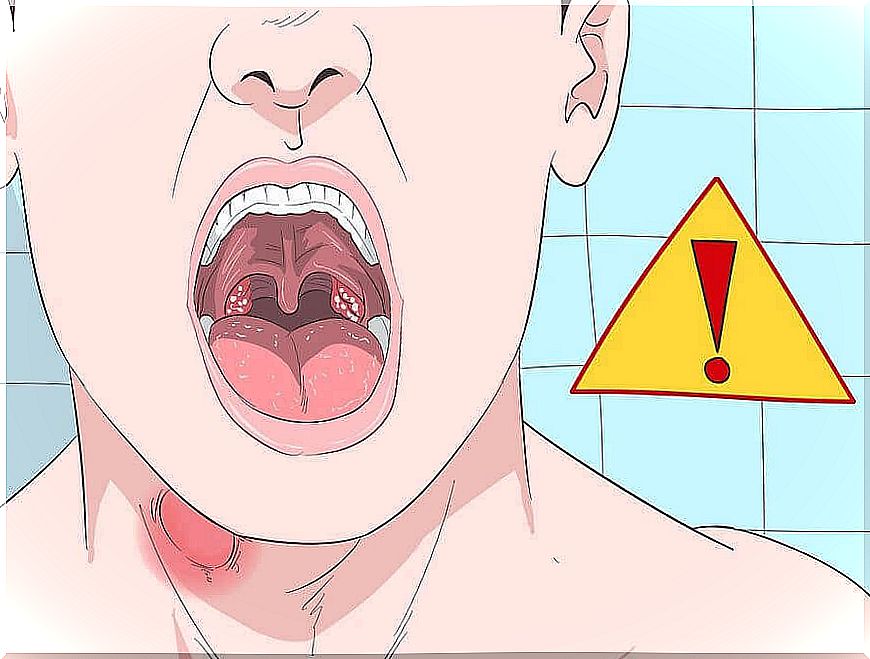5 Signs Of Lumps In The Throat
The bulges in the vocal cords are known as knots. These lumps in the throat are sometimes mistaken for polyps, but they are two different things.

In nodes in the throat is bulging on the vocal cords, which arise when the voice for a long time is severely stressed. They are not canker sores.
It is very important to correctly diagnose the symptoms of the lump in the throat and to initiate appropriate treatment as soon as possible.
Causes of the formation of lumps in the throat
- Scream,
- clear throat,
- chronic cough,
- long, loud speaking or
- Sing in a forced voice.
If the vocal cords are used too much over a long period of time, small injuries will eventually form that can expand. This means that an inflammation will eventually turn into the lumps in the throat.
Most common symptoms of lump in the throat
1. Hoarse voice

At first, hoarseness can become noticeable, which can vary in strength and affect the voice. The breathing air can no longer be controlled as well and is no longer sufficient to finish your own sentences.
2. Voice fatigue
Affected people often feel dryness in the throat or larynx and clear their throat frequently.
3. Tense neck muscles

There are various reasons for muscle tension, from dehydration, overweight, poor posture to abrupt movements, to name just a few. This is a common problem that develops due to a muscle block in the affected area.
If there is a lump in the throat, there may be a lot of tension in the neck area, which in turn could lead to headaches or other forms of discomfort.
4. Cough
The feeling of a foreign object in the throat. The cough can become very painful ; especially if it persists over a long period of time and occurs at short intervals.
5. Physical and voice fatigue

When the organism makes an effort, it inevitably leads to fatigue. In the case of the voice, further discomfort occurs as the vocal cords become fatigued .
Which further promotes lumps in the throat
- Allergies
- Tobacco use
- insufficient breathing flow
- Reflux esophagitis
- too humid environment
- occupational stress on the voice: teachers, speakers, singers
- irritating gases or chemical products
The diagnosis

If you are hoarse for more than two or three weeks, you should consult a doctor. A full exam includes a medical history review, physical exam, and patient interview.
In addition, the following documents may also be required for the medical diagnosis:
- neurological examination
- Examination by an ENT doctor (ear, nose and throat)
- Voice check-up carried out by a speech therapist
- Laryngoscopy to examine the vocal cords
Treatments for lumps in the throat
Lumps in the throat can be treated surgically, with medication, or by voice re-education.
Surgery
This removes the knot from the vocal cord. This treatment is only recommended if the lumps are very large or have existed for a long time.
Medication

At times, drug treatment may be necessary to prevent further damage to the vocal cords. This includes treatment for reflux oesophagitis, allergies, and the thyroid gland.
Voice re-education
Therapy involves learning good oral hygiene and helping to get rid of bad vocal habits. That means regulating the pitch and volume of the voice appropriately and controlling the breath so that the voice can be used optimally and nevertheless gently.
Other methods of treatment
- Absolute prohibition of speaking.
- If the lumps are still small or soft, they can be treated with anti-inflammatory steroids.
- Voice exercises to restore the vocal cords to working properly.
How can you prevent lumps in the throat?
- Don’t strain your voice.
- When you sing, teach, or speak professionally, your voice needs regular rest.
- You need to develop new mouth habits so that you can do your job safely and calmly.
- Parents should make sure that their children learn from an early age to use their voice correctly so that there is no tension.
- If you are not sure whether you have a lump in your throat, you should seek medical advice. A gentle and painless examination can easily tell whether you have any or not.









